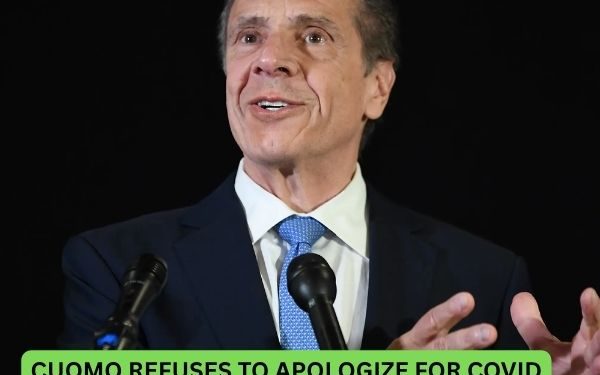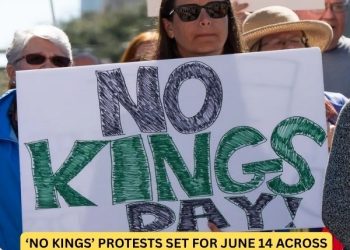NEW YORK CITY — Former New York Governor Andrew Cuomo found himself on the defensive Thursday night during a heated mayoral debate when he was confronted by a grieving son whose father died during the COVID-19 pandemic. Despite renewed scrutiny over his administration’s handling of nursing homes in early 2020, Cuomo declined to apologize for the state’s policy that critics argue led to thousands of avoidable deaths.
The flashpoint came as City Comptroller Brad Lander introduced Peter Arbeeny, whose father Norman Arbeeny died of COVID-19 shortly after being discharged from a rehabilitation facility. The emotional moment drew strong reactions from the audience, with many demanding accountability from the former governor.
“Andrew, this is Peter Arbeeny,” Lander said, as the crowd erupted in cheers.
“His father Norman died because of your disastrous order to send people with COVID into nursing homes. Then, as you admitted this week, you hid the real death toll and lied to families about it for five years,” Lander added.
Cuomo Deflects, Offers No Full Apology
Instead of addressing the core of the accusation, Cuomo deflected by questioning Lander’s credibility and regional roots.
“Maybe where you come from in St. Louis facts don’t matter, but here they do,” Cuomo quipped.
While Cuomo did express sympathy toward Peter Arbeeny directly, he stopped short of accepting responsibility or offering a broader apology for his pandemic-era decisions.
“Mr. Arbeeny lost a father. I am very, very sorry for that,” Cuomo said.
“But it is factually impossible, Brad,” he added, sarcastically, “that he got COVID, OK, from someone coming from a hospital,” referencing legal documents from a dismissed class-action suit brought against the state.
Cuomo cited the dismissal of that lawsuit — filed by Peter Arbeeny’s brother, Daniel Arbeeny, in federal court — as validation that the nursing home policy did not cause Norman’s death. That suit, which alleged misconduct in the state’s nursing home directives, was dismissed by a Brooklyn federal judge earlier this year.
Controversial Policy Still Haunts Cuomo
The incident onstage Thursday reignited public anger over Cuomo’s March 2020 directive, which required nursing homes to accept recovering COVID-19 patients from hospitals. Critics say this policy seeded outbreaks in facilities housing the most vulnerable populations.
Cuomo has long defended the policy, claiming it was in line with federal guidance from the Centers for Medicare & Medicaid Services (CMS) at the time. However, critics argue that the state ignored common-sense precautions and later tried to cover up the consequences.
In 2021, the New York State Attorney General’s Office revealed that Cuomo’s administration had undercounted COVID-related deaths in nursing homes by as much as 50%. The revelation sparked widespread calls for Cuomo’s resignation, which came later that year amid unrelated sexual harassment allegations.
More recently, Cuomo admitted that he reviewed — and may have influenced — edits to a state health department report on nursing home fatalities, fueling accusations of a cover-up.
Grieving Families Still Demand Justice
Speaking to reporters after the debate, Peter Arbeeny said Cuomo’s refusal to take responsibility was “painful but expected.”
“He just won’t say it — that he made a mistake,” Arbeeny said. “We lost our father, and we were misled. That should matter.”
Lander also criticized Cuomo’s response during a post-debate press conference.
“This wasn’t about politics. This was about a grieving son, and Cuomo still couldn’t find the decency to tell the truth,” Lander said.
Political Implications and Fallout
Cuomo’s refusal to issue a full apology may further damage his standing among New Yorkers still grappling with the pandemic’s legacy. Although he has hinted at a political comeback in recent months, moments like Thursday’s debate serve as stark reminders of the unresolved controversies tied to his administration.
The debate also highlighted how COVID-era policies remain potent political weapons in New York’s current mayoral race, even as voters turn their attention to economic and public safety concerns.
As the mayoral field narrows ahead of the primary, Cuomo’s record — and his response to it — could be a defining issue for voters and candidates alike.










